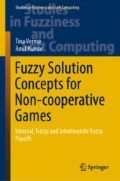Abstract
The following research work may be considered as future research work: 1. In this thesis, only flaws in some existing methods for matrix games/constrained matrix games with inter-val/fuzzy/intuitionistic fuzzy payoffs are pointed out and to resolve flaws of these existing methods, new methods are proposed.
Access this chapter
Tax calculation will be finalised at checkout
Purchases are for personal use only
References
Aggarwal, A., Chandra, S., Mehra, A.: Solving ma-trix games with I-fuzzy payoffs: pareto-optimal security strategies approach. Fuzzy Inf. Eng. 6, 167–192 (2014)
Aggarwal, A., Dubey, D., Chandra, S.: Application of Atanassov’s I-fuzzy set theory to matrix games with fuzzy goals and fuzzy payoffs. Fuzzy Inf. Eng. 4, 401–414 (2012)
Aggarwal, A., Mehra, A., Chandra, S.: Application of linear programming with I-fuzzy sets to matrix games with I-fuzzy goals. Fuzzy Optim. Decis. Mak. 11, 465–480 (2012)
Bector, C.R., Chandra, S.: On duality in linear programming under fuzzy environment. Fuzzy Sets Syst. 125, 317–325 (2002)
Bector, C.R., Chandra, S.: Fuzzy Mathematical Programming and Fuzzy Matrix Games. Springer, Heidelberg (2005)
Bector, C.R., Chandra, S., Vijay, V.: Bimatrix games with fuzzy payoffs and fuzzy goals. Fuzzy Optim. Decis. Mak. 3, 327–344 (2004)
Bector, C.R., Chandra, S., Vijay, V.: Duality in linear programming with fuzzy parameters and matrix games with fuzzy pay-offs. Fuzzy Sets Syst. 46, 253–269 (2004)
Bector, C.R., Chandra, S., Vijay, V.: Matrix games with fuzzy goals and fuzzy linear programming duality. Fuzzy Optim. Decis. Mak. 3, 255–269 (2004)
Chang, J.R., Chang, K.H., Liao, S.H., Cheng, C.H.: The reliability vague fault-tree analysis on weapon systems fault diagnosis. Soft Comput. 10, 531–542 (2006)
Li, D.F.: Mathematical-programming approach to matrix games with payoffs represented by Atanassov’s interval-valued intuitionistic fuzzy sets. IEEE Trans. Fuzzy Syst. 18, 1112–1128 (2010)
Li, D.F., Nan, J.X.: A nonlinear programming approach to matrix games with payoffs of Atanassov’s intuitionistic fuzzy sets. Int. J. Uncertain. Fuzziness Knowl. Based Syst. 17, 585–607 (2009)
Nan, J.X., Li, D.F.: Linear programming approach to matrix games with intuitionistic fuzzy goals. Int. J. Comput. Intell. Syst. 6, 186–197 (2013)
Nan, J.X., Li, D.F.: Linear programming technique for solving interval-valued constraint matrix games. J. Ind. Manag. Optim. 10, 1059–1070 (2014)
Vijay, V., Chandra, S., Bector, C.R.: Bimatrix games with fuzzy goals and fuzzy payoffs. Fuzzy Optim. Decis. Mak. 3, 327–344 (2004)
Vijay, V., Chandra, S., Bector, C.R.: Matrix games with fuzzy goals and fuzzy pay offs. Omega 33, 425–429 (2005)
Vijay, V., Mehra, A., Chandra, S.: Fuzzy matrix games via a fuzzy relation approach. Fuzzy Optim. Decis. Mak. 6, 299–314 (2007)
Author information
Authors and Affiliations
Corresponding author
Rights and permissions
Copyright information
© 2020 Springer Nature Switzerland AG
About this chapter
Cite this chapter
Verma, T., Kumar, A. (2020). Future Scope. In: Fuzzy Solution Concepts for Non-cooperative Games. Studies in Fuzziness and Soft Computing, vol 383. Springer, Cham. https://doi.org/10.1007/978-3-030-16162-0_6
Download citation
DOI: https://doi.org/10.1007/978-3-030-16162-0_6
Published:
Publisher Name: Springer, Cham
Print ISBN: 978-3-030-16161-3
Online ISBN: 978-3-030-16162-0
eBook Packages: Intelligent Technologies and RoboticsIntelligent Technologies and Robotics (R0)

